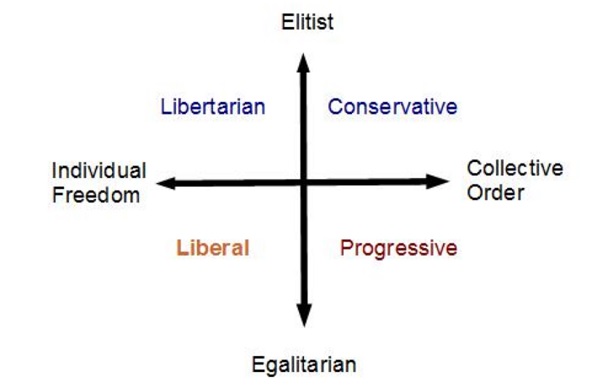
Today’s political landscape looks less and less like “right” versus “left” and more like something multidimensional.
Libertarians have long advocated a political compass with the individualism-collectivism and cultural-economic axes, because it highlights the differences between themselves and traditional conservatives. But culture and economics are both really about power, and the recent rise of an authoritarian cultural left leaves it looking out-of-date. When one of the four quadrants best describes two totalitarian ideologies from the second quarter of the 20th century that have both been completely discredited, is it really relevant?
So as an alternative, what about axes of individualism-collectivism and egalitarianism-elitism instead? That make better sense of explain the fundamental split on the liberal left.
On the top right-hand corner we have traditional conservatives, who stand for order through established hierarchies. They consider the existence of a ruling class as part of the natural and proper order of things, though they do accept democracy as a means to keep those elites honest. Conservatives are prepared accept slow and gradual social change, but only when they’d obviously be on the wrong side of history if they didn’t.
On the top left-hand corner we have libertarians. They reject order and stability in favour of disruption and change, and favour the individual over the collective. But they don’t reject the concept of elites, only opposing the existing elites. Libertarians are unique in their distrust and sometimes outright rejection of democracy, because they fear the tyranny of the majority threatens the freedom of the individual.
In the bottom right-hand corner we have what I will call progressives. Progressives believe in collective action to counter established power hierarchies, and strongly support democracy as a means of empowering the people against the establishment. The belief in the collective over the individual means progressives can sometimes see dissent as an undermining of solidarity.
Finally, in the bottom left-hand corner we have liberals. Liberals share progressives’ opposition to power hierarchies, but reject their emphasis on the collective over the individual on the grounds that it can become an oppressive power in its own right. Likewise, liberals share libertarians’ belief in individual freedom, but reject their embrace of inequality and love of power. Liberalism could be considered as a centrist position between the two, but it’s more than that; a belief than egalitarianism and freedom are not polar opposites makes it a distinctive position in its own right.
Like any model, this is a simplification. They are spectrums of opinion rather than four distinct and separate political tribes, and mainstream political parties are by necessity big tents; there are both progressives and libertarians in the Liberal Democrats, for example. But just as the distinction between conservatism and libertarianism became apparent a generation ago, the distinction between liberalism and progressivism is now becoming apparent in the increasingly bitter culture wars over identity politics and freedom of speech.
